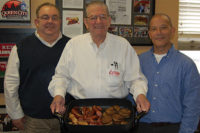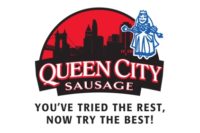| Restaurant Profile: Mettle |
|
A relative newcomer to the Austin scene, Mettle has been open for less than six months, but its reputation is quickly growing. There are many casual neighborhood bistros in town, but Chef Andrew Francisco has put his own spin on the menu, setting the restaurant apart. Francisco has been in Austin since 2002, and he has seen the growth and changes to Austin’s dining scene. “It’s an ambitious city, and more and more chefs are putting their own personalities on their menus, which creates a really eclectic dining scene,” he explains. “And we’re all very conscious of the product that we serve, which certainly helps with getting respect nationwide.” Francisco spent his teenage years in Malaysia, so Mettle’s menu has a Southeast Asian flair. He also has a love of Tex-Mex food, leading to creations such as beef tongue tacos, pork belly quesadillas and a beef short rib French dip sandwich. The restaurant is also known for its fried chicken. Francisco is a proponent of natural meats, raised without hormones or antibiotics. “I have three kids,” he explains, “and those things create problems for generations if we keep raising our livestock like that. Ultimately, though, [natural] is a better product.” Lone Star Foodservice provides all the proteins used on Mettle’s menu, from flat-iron steaks to the brisket used in Mettle’s hamburgers. Francisco appreciates that the company is local and is committed to locally raised product. The quality of the meat is of greatest importance, but he also notes the company’s strong customer service. “If our food is great but the waiter is mean to you, you’re probably not going to come back. It’s like that with using purveyors,” he says. |
| Restaurant Profile: Trace |
|
Located at the W Austin, Trace takes its name from “traceability.” The restaurant employs an on-staff forager, whose job is to visit farmer’s markets and establish relationships to find local, sustainable food. Chef Lawrence Kocurek is a native Austinite and is on his second stint as a chef in town after stops in New York and Florida. He’s worked at Trace for about a year, but he is no stranger to Lone Star Foodservice, having worked with the company in the past. He recalls that Lone Star CEO Franklin Hall came to the restaurant to interview him and see what he was doing on the menu. “I had never had the owner of a purveyor company come and talk to me, and I’ve never looked back as far as using Lone Star,” Kocurek says. He compliments Lone Star for finding products that he requested. He notes that chickens raised from local farmers can vary greatly in size, which can present a problem in a kitchen. Since Lone Star brought on the organic, air-chilled Smart Chicken, consistency isn’t an issue. The restaurant uses the whole chicken, producing its own chicken breakfast sausage in-house from the legs and thighs. The chicken breast has been a surprise hit on the menu as an entrée. “When I put the chicken dish on, I thought, ‘We’re not going to sell any of these,’” Kocurek recalls. “The first week I had to order two more cases on the fly, because I didn’t expect to sell that much. Something as mundane as chicken for chefs to really geek out over — it doesn’t really happen.” Another popular entrée is a beef tasting. It includes an aged ribeye filet, a roasted marrow bone, beef cheek, ravioli stuffed with blue cheese and oxtail, sweetbread and a grilled honey-mustard tongue. The sauce is a beef heart ragout. “The only thing I haven’t been able to get away with putting on the plate is the brain — but I want to,” Kocurek says with a laugh. |













Report Abusive Comment